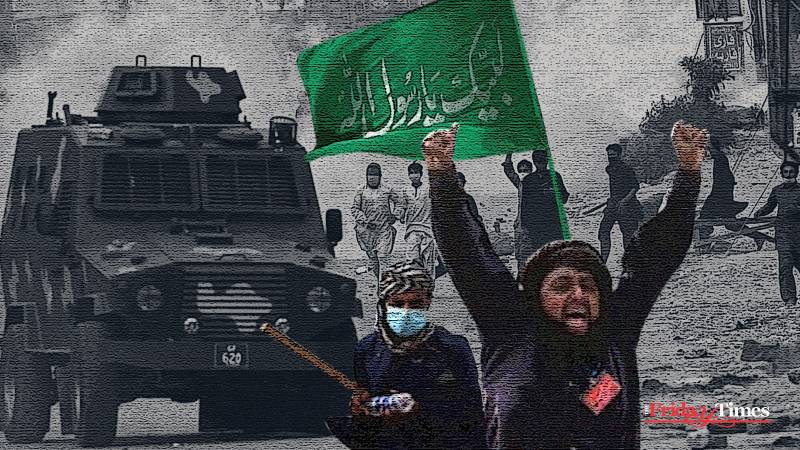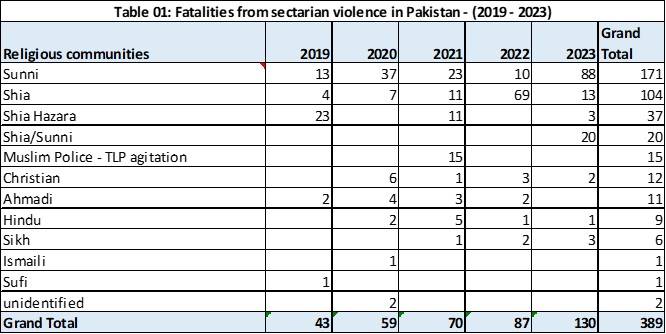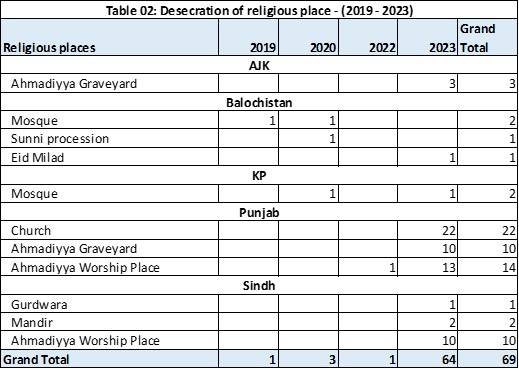
Religious hatred, despite numerous efforts to curb it, has been escalating in the country in different shapes and forms. One of its most prominent root causes is religious extremism, propagated by zealots through ideological teachings and executed by militants through violence. After tolerating militant groups for nearly two decades—often perceived as covertly harboring them for internal and external agendas—Pakistan has officially banned recently two militant groups: Hafiz Gul Bahadur Group (HGBG) and Majeed Brigade of the Baloch Liberation Army (BLA). The HGBG, once considered the "Good Taliban" has recently allied itself with the Tehreek-e-Taliban Pakistan (TTP) and is believed to be operating from Afghanistan.
The effects of this action on the country's security situation are difficult to predict, especially given that similar actions in the past, when these militant organizations operated from within Pakistan, yielded limited positive results. The question that remains unanswerable is: if such measures did not succeed then, what can be achieved now when these groups are based outside the country? All we can do is maintain hope and await the outcomes, whether positive or negative.
As a further step, Pakistan has not only proscribed these militant organizations but also labeled the notorious TTP as "Fitna al Khawarij." The rationale behind this shift in narrative is stated as follows: "Given the involvement of the so-called Tehreek-i-Taliban Pakistan (TTP) in activities detrimental to Islamic faith and contradictory to the true teachings and essence of Islam, it has been decided that, henceforth, the TTP will be referred to as Fitna al Khawarij."
It's not the first time the government has rejected the religious ideology of the TTP and other militant groups. However, the recent unequivocal condemnation and strong language used to denounce them signal a new realization among our policymakers. Labeling the TTP as "Fitna al Khawarij" acknowledges that the terrorism perpetrated by the TTP and similar militants is fueled by religious hatred, which they use to justify their unlawful actions. This issue extends beyond militancy, as other forms of violence plaguing the country also stem from religious hatred.
Since the Afghan Taliban took over power in Afghanistan, not only has the wave of terrorism intensified across our country, but the violence has also escalated.
While corruption is often seen as the root of many problems, religious hatred surpasses all other crimes in its severity. Militancy, engulfing the country, is an extreme manifestation of religious hatred once fostered by internal and external forces for political purposes, and has now become a formidable challenge to the authority of the government both domestically and internationally. They pose a threat to the economy, such as the China-Pakistan Economic Corridor (CPEC) project, and to social and religious harmony due to their animosity towards other faiths and sects. Their militant acts have pushed Pakistan into conflict with its neighboring countries like Iran and Afghanistan. Moreover, they cultivate a mindset of narcissism rooted in self-righteousness, where opponents are deemed deserving of elimination.
Since the Afghan Taliban took over power in Afghanistan, not only has the wave of terrorism intensified across our country, but the violence has also escalated. A week before Ashura, Afghan Taliban began a campaign against Ashura ceremony calling it as a “political innovation” that doesn’t exist in the Holy Quran and the Taliban officials emphasized on the necessity of abstaining from such innovations. Videos and images went viral on social media depicting Taliban members removing and tearing down Ashura flags in Shia areas, asserting that such flags should not be displayed in public spaces like streets or rooftops.
A couple of days later, an explosion caused by a hand grenade blast at the Imamzadeh Yahya shrine in Sar-e-pol, Afghanistan left seven individuals wounded during the Muharram ceremony. On 21 July 2024, Afghan newspaper, Hasht-e-Subh (8am) reported: “Taliban-uniformed individuals murdered a Hazara Shia cleric named Rustam Rahimi with knife blows in the Shashpar area of Khas Uruzgan district, Uruzgan province, and then fled the scene.”
The Shia community is not the only one being targeted by the militants and extremists, almost all other religious faiths are victims of such violence in the country.
Coincidentally, two major sectarian violence took place outside Afghanistan and the reports indicated involvement of terrorist groups that are enjoying sanctuaries in Afghanistan. On July 18, 2024, six people were killed at a Shia mosque in Muscat which was claimed by the banned militant Islamic State (IS) group. Four of the victims were Pakistanis, one Indian and a police officer. Two weeks later, guns, mortars, and rocket fires resounded in Kurram valley of Pakistan on a land dispute that later turned out to be a sectarian clash between Sunnis and Shia leaving at least 49 persons dead and 200 injured. No militant groups claimed responsibility of their involvement in these clashes. However, during a debate on law and order situation in KP assembly, the JUI-F’s Muhammad Riaz made a startling revelation. He said, “a militia of 4,000 men from banned organisations was prepared for clashes in Kurram district, and that ammunition depots were present in the area.”
The Shia community is not the only one being targeted by the militants and extremists, almost all other religious faiths are victims of such violence in the country. Data maintained by the Center for Research and Security Studies on sectarian violence reflects that from 2019 to 2023, nearly 389 persons lost their lives because of sectarian violence in the country. Of them the highest were Sunni Muslims (171 persons), followed by Shia and Shia Hazaras (141), Christians (12), Ahmadis (11), Hindus (9), Sikhs (6), and Ismailis (1).

Religious hatred has not only claimed 389 lives over the past four years, 69 religious places were also desecrated during this period. The majority of these places belonged to the Ahmadiyya community (37), with additional incidents involving 22 churches (a blasphemy incident provoked a mob to vandalize churches in Jaranwala), 4 mosques (suicide attacks, bomb explosions, and target killing of a policeman while performing his namaz), 2 Hindu Mandirs, 1 Eid Milad procession (suicide attack), and one Sikh Gurdwara. Notably, 64 out of these 69 desecrations occurred in 2023 alone.

Regarding the desecration of Ahmadiyya worship places, a Lahore High Court’s verdict prohibits such actions at Ahmadiyya worship places resembling mosques that predate the blasphemy law. These sites cannot be forcibly altered, prosecuted under the blasphemy law, or treated as a "continuing offence." Despite this court order, the desecration of Ahmadiyya worship places has persisted, particularly in Punjab, often with the involvement of the police.
As opposed to Punjab, Sindh police registered an FIR under sections 147, 148, 149, 427, 504, 506-B, and 295 of the Pakistan Penal Code and Section 7 of the Anti-Terrorism Act 1997 against unidentified individuals accused of attacking an Ahmadiyya worship place in Karachi’s Martin Road area but no arrest could be made.
Religious fundamentalists often ignore such court orders because they consider their beliefs superior to legal rulings, attributing sanctity to their religious convictions. Similar to how the TTP regards its religious faith as superior to others, these fundamentalists, in pursuing what they deem a sacred cause, frequently fail to recognize the lawlessness and anarchy they create in the country.
In July, Pir Zaheerul Hasan Shah, the vice-emir of Tehreek-i-Labbaik Pakistan (TLP), during a protest outside the Lahore Press Club, incited hatred against the judiciary and announced a reward of PKR10 million for anyone who brings the head of Justice Faez Isa.
The irony of the situation lies in both the government and militant groups using religious narratives to counter each other. The TTP and its allies seek to implement their version of Sharia in the country, while the government condemns their beliefs as fitna, viewing them as contradictory to the true teachings of Islam.
The National Assembly convened a session to discuss this threat to the CJP Faiz Isa. With the exception of PMLN members Azam Tarar and Hanif Abbasi, all other parties criticized the Chief Justice of Pakistan (CJP) for issuing a controversial judgment that acquitted an Ahmadi. Hanif Abbasi stated that the proliferation of fatwa (decrees) could not be allowed. Sahibzada Hamid Raza of Sunni Tehreek and Maulana Abdul Ghafoor Haideri of JUI-F criticized the Supreme Court for attempting to rewrite the Constitution. Qadir Patel of the PPP asked the Federal Law Minister, "Please tell these judges that they are creating fitna in the country by issuing such orders."
While the parliamentarians were divided on this subject, the Council of Islamic Ideology was not. They issued a statement clarifying that no individual, group, or mob has the legal or religious authority to act as judge and issue a fatwa or decree for someone's murder.
However, the militants responsible for spreading deaths and miseries in the country took the fatwa as justification to target judges. Two days after the National Assembly discussion, terrorists attacked a convoy carrying local court judges in Khyber Pakhtunkhwa. While two policemen lost their lives in the attack, the judges remained unharmed. For the militants, it was a message delivered to the judiciary, signaling a job accomplished.
All these incidents are indicative of a growing trend of violence and intolerance in the name of religion. The irony of the situation lies in both the government and militant groups using religious narratives to counter each other. The TTP and its allies seek to implement their version of Sharia in the country, while the government condemns their beliefs as fitna, viewing them as contradictory to the true teachings of Islam. Meanwhile, religious and political parties criticize the judiciary for creating fitna through controversial judgments on blasphemy related cases.
This divisiveness in handling issues of violence poses insurmountable challenges to achieving peace, harmony, and national unity. Unless we reassess our policies and develop an approach that addresses sensitive matters with patience and analytical rigor, ongoing violence and intolerance will continue to thrive. Consequently, neither Muslims nor non-Muslims, along with their religious places, will remain safe.

